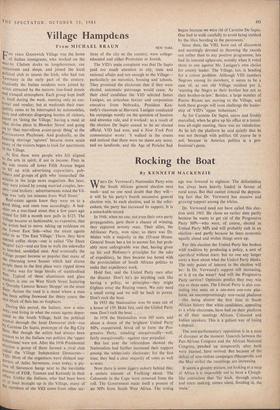Rocking the Boat
By KENNETH MACKENZIE WHEN Dr. Verwoerd's Nationalist Party wins the South African general election next week—and no one need doubt that they will— it will be his party's fourth successive general election win. In each election, and in the refer- endum, the party has increased its support. It is a remarkable record.
In 1948, when no one, not even their own party propagandists, gave them a chance of winning, they captured seventy seats. Their allies, the Afrikaner Party, won nine;, so there was Dr. Malan with a majority in the 153-seat House. General Smuts has a lot to answer for, but prob- ably most unforgivable was that, having given up his and Hofmeyr's principles for the sake of expediency, he then became too bored with the provincialism of South African politics to make that expediency work.
Hold fast, said the United Party men after the disaster. Don't let's do anything rash like having a policy, or principles—they might frighten away the floating voters. We only need a small swing and we will be back in power. Don't rock the boat.
In 1953 the Nationalists won 94 seats out of a house of 159. Hold fast, said the United Party men. Don't rock the boat. . . .
In 1958 the Nationalists won 103 seats, and about a dozen of the brightest United Party MPs, exasperated, hived off to form the Pro- gressive Party, standing unequivocally—well, fairly unequivocally—against race prejudice.
But last year the referendum showed the Nationalists had further increased their support among the whites-only electorate; for the first time, they had a clear majority of votes as well as seats.
Now there is some jiggery-pokery behind this; a certain amount of Foulking about. The Coloureds in the Cape were removed from the roll. The Government made itself a present of six MPs from South West Africa. The voting age was lowered to eighteen. The delimitation has alway been heavily loaded in favour of rural areas. But that cannot conceal the depress- ing fact that Dr. Verwoerd has massive and growing'support among the whites.
Dr. Verwoerd need not have called this elec- tion until 1963. He chose an earlier date partly because he wants to get rid of the Progressive Party MPs—who were, of course, elected as United Party MPs and will probably sink in an election—and partly because he fears economic squalls ahead and wishes things sewn up.
For this election the United Party has broken with tradition by producing a policy, a sort of apartheid without tears; but no one any longer cares a hoot about what the United Party thinks. The only points of interest in the election will be: Is Dr. Verwoerd's support still increasing, or is it on the wane? And will the Progressive Party survive? Optimists predict they may win two or three seats. The Liberal Party is also con- testing two seats on a one-man one-vote plat- form, an uncompromisingly non-racial platform —this being almost the first time in South African history that white candidates, appealing to a white electorate, have had on their platform at all their meetings African, Coloured and Indian speakers. This is a gallant way of losing a deposit.
The non-parliamentary opposition is in a state of disrepair at the moment. Quarrels between the Pan-African Congress and the African National Congress, patched up temporarily after both were banned, have revived. But because of the defeat of non-violent campaigns (Sharpeville and the May strike) the rumblings are increasing.
It seems a gloomy picture, yet looking at a map of Africa it is impossible not to have a Clough- like conviction that 'far back, through creeks and inlets making, comes silent, flooding in, the main.'






































 Previous page
Previous page